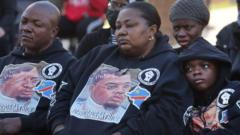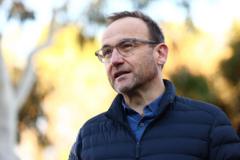As Belarus gears up for an election widely considered illegitimate, the opposition remains vigilant in denouncing the regime's tactics and maintaining hope for the future despite intensifying repression from authorities.
**Belarus Elections: Opposition Condemns Legitimacy Amid Ongoing Repression**

**Belarus Elections: Opposition Condemns Legitimacy Amid Ongoing Repression**
Exiled leaders decry the upcoming elections in Belarus as a facade, highlighting entrenched authoritarianism and fear within the population.
In a recent statement, exiled opposition leader Svetlana Tikhanovskaya denounced the election scheduled for Sunday in Belarus as a "sham," characterizing it as a mere "performance staged by the regime" to maintain power. This election is set against the backdrop of Alexander Lukashenko's three-decade rule, which has come under increasing scrutiny and criticism, particularly following the massive protests in 2020 sparked by perceived electoral fraud.
Lukashenko, who has been solidified in his position with strong backing from Russian President Vladimir Putin, will appear on the ballot alongside four other handpicked candidates, none viewed as a real challenge to his authority. Independent observers have been barred from monitoring these elections, raising further alarms about the process's legitimacy.
The opposition leader Tikhanovskaya, who has been in exile since the protests following the controversial elections in 2020, refrained from calling for immediate public demonstrations, advising Belarusians to prioritize their safety amid an atmosphere of fear and repression. Many activists and former protesters are either imprisoned, have fled the country, or remain silent due to a climate of intimidation.
The brutal crackdown following the 2020 protests has left a significant mark on the would-be opposition. Political prisoners remain a prominent issue, with the organization Viasna currently documenting at least 1,256 individuals behind bars for expressing dissent. Former political prisoners, like veterinarian Yana Zhuravleva, recount the harrowing experiences of incarceration, reflecting on the psychological toll of imprisonment and repression.
Despite the pervasive fear, a subset of the Belarusian populace continues to seek ways to promote political activism, albeit cautiously. Many have turned to encrypted messaging to discuss matters of dissent, reflecting a profound sense of insecurity and desperation within the country. The idea of open political expression has been all but extinguished in Belarus, with a significant decline in public protests and activism following the earlier waves of opposition.
Lukashenko's alignment with Putin serves not only to fortify his regime but also complicates the geopolitical landscape, as Belarusian territory is now a launch point for Russian missile strikes in Ukraine. Tikhanovskaya has been vocal about the continued threat posed by both leaders, citing the dangers they pose not only to Belarus but to the wider region.
As the election looms, there is a palpable sense of resignation among those who yearn for democracy, with many viewing Lukashenko's eventual departure as a critical juncture for the nation's future. However, amid the bleakness, cultural preservation and a revival of Belarusian language and identity have emerged as focal points for hope in a climate of repression, reflecting a resilient spirit within the populace.
While Tikhanovskaya and others remain steadfast advocates for change, the immediate future continues to be overshadowed by fears of retaliation and the ongoing grip of authoritarian control in Belarus.
Lukashenko, who has been solidified in his position with strong backing from Russian President Vladimir Putin, will appear on the ballot alongside four other handpicked candidates, none viewed as a real challenge to his authority. Independent observers have been barred from monitoring these elections, raising further alarms about the process's legitimacy.
The opposition leader Tikhanovskaya, who has been in exile since the protests following the controversial elections in 2020, refrained from calling for immediate public demonstrations, advising Belarusians to prioritize their safety amid an atmosphere of fear and repression. Many activists and former protesters are either imprisoned, have fled the country, or remain silent due to a climate of intimidation.
The brutal crackdown following the 2020 protests has left a significant mark on the would-be opposition. Political prisoners remain a prominent issue, with the organization Viasna currently documenting at least 1,256 individuals behind bars for expressing dissent. Former political prisoners, like veterinarian Yana Zhuravleva, recount the harrowing experiences of incarceration, reflecting on the psychological toll of imprisonment and repression.
Despite the pervasive fear, a subset of the Belarusian populace continues to seek ways to promote political activism, albeit cautiously. Many have turned to encrypted messaging to discuss matters of dissent, reflecting a profound sense of insecurity and desperation within the country. The idea of open political expression has been all but extinguished in Belarus, with a significant decline in public protests and activism following the earlier waves of opposition.
Lukashenko's alignment with Putin serves not only to fortify his regime but also complicates the geopolitical landscape, as Belarusian territory is now a launch point for Russian missile strikes in Ukraine. Tikhanovskaya has been vocal about the continued threat posed by both leaders, citing the dangers they pose not only to Belarus but to the wider region.
As the election looms, there is a palpable sense of resignation among those who yearn for democracy, with many viewing Lukashenko's eventual departure as a critical juncture for the nation's future. However, amid the bleakness, cultural preservation and a revival of Belarusian language and identity have emerged as focal points for hope in a climate of repression, reflecting a resilient spirit within the populace.
While Tikhanovskaya and others remain steadfast advocates for change, the immediate future continues to be overshadowed by fears of retaliation and the ongoing grip of authoritarian control in Belarus.























